Human biases are ubiquitous but not uniform: disparities exist
across linguistic, cultural, and societal borders.
As large amounts of recent literature suggest, language models (LMs)
trained on human data can reflect and often amplify the effects of
these social biases. However, the vast majority of existing studies
on bias are heavily skewed towards Western and European languages.
In this work, we scale the Word Embedding Association Test (WEAT)
to 24 languages, enabling broader studies and yielding interesting
findings about LM bias. We additionally enhance this data with
culturally relevant information for each language, capturing local
contexts on a global scale. Further, to encompass more widely
prevalent societal biases, we examine new bias dimensions across
toxicity, ableism, and more. Moreover, we delve deeper into the
Indian linguistic landscape, conducting a comprehensive regional
bias analysis across six prevalent Indian languages. Finally, we
highlight the significance of these social biases and the new
dimensions through an extensive comparison of embedding methods,
reinforcing the need to address them in pursuit of more equitable
language models.





